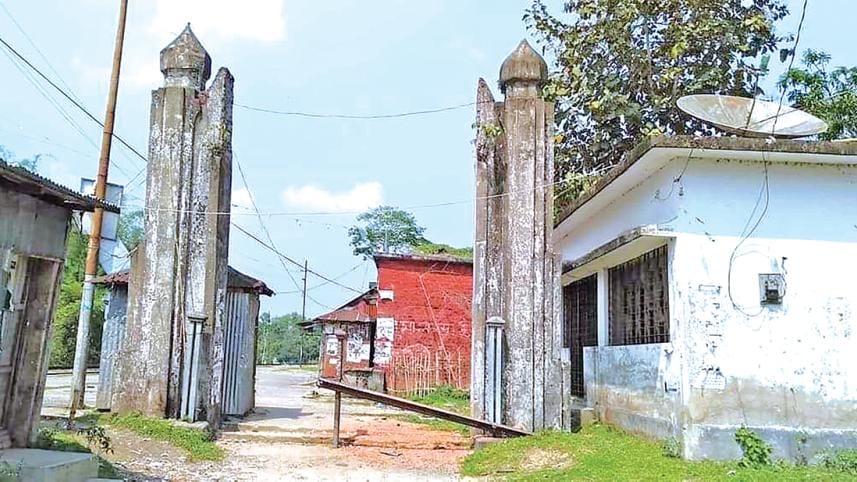Lungla Station:our heritage and pride

It is a testimony to the glory days of old. It bears witness to many events which characterise the place, and puts it in the annals of history. Since the days of the British colonialism, this was the main gateway to Prithimpassa through rail and the adjoining areas, and was mainly used by the zamindars of the region, and was also the main railway station of the nawabs of Prithimpassa. Today, it stands forgotten and ignored, slowly decaying with time as there is negligible care and maintenance. There is no upkeep and a sense of apathy prevails on the part of the authorities. Total ignorance also prevails regarding its history and its important place in the history of the region. Where the two pillars once stood proudly, witnessing the glorious days when great personalities walked down the railway station's platform, today, those same pillars stand in a dilapidated and derelict condition. It is unfortunate that no one shows any sympathy or knowledge regarding it, or expresses any desire to step forward to reclaim it and save it from disappearing from the pages of antiquity and fading into oblivion.

This railway station was not just another embarking and disembarking point for people travelling by train to different parts of the country, it was the railway station of the zamindars of Prithimpassa, and this held a special place in their itinerary. It is not just an ordinary railway station; many dignitaries, heads of state, eminent personalities, poets, philosophers, zamindars, nawabs, generals and political leaders and luminaries travelled to this station, by train on their way to Prithimpassa and beyond.
In the 50's, parts of the shooting for the Hollywood movie "Around the World in 80 Days" took place in these areas —Srimangal, Bhanugach etc. The nawabs of Sylhet received the Shah of Iran as their personal guest in March, 1950, here. To welcome and pay tribute to the Shah, two columns were built, which still stand, albeit in a derelict condition, and need immediate repair and restoration, as they bear witness to that special and momentous day when the sights and sounds of the royal visit lighted and livened up the place, carving for it, a place in the region's history. It was a grand welcome, which impressed the emperor, and he expressed his gratefulness and delight to the nawabs, his hosts. Can we let it wane on our watch, knowing full well its place in history?
It would be a shame that citizens of the region will allow this significant piece of history to simply fade into oblivion without making an effort to salvage it. Today, no express train stops here; a place which was once home to ministers in the 30s, MPs during the time of Bangabandhu, and eminent politicians, social workers, freedom fighters et al is not regarded important enough for express trains to stop for passengers boarding and getting down here. It is utterly disgraceful that we are not even considering this of any significance, or have the motivation to ensure its preservation and induction to a level at par with Kulaura or Srimangal railway station.
Lungla station is our heritage and we cannot fail it. It has to be saved and restored. It is our solemn duty to act, and act now, lest this part of our heritage descends into a lost and forgotten part of our history.
It is unfortunate that it has been left to decay, forgotten by the authorities as well as the local elites, politicians and social activists. Even if we look at it from the heritage point of view, I am sure much can be done, and it won't be a futile attempt, and we would be able to add to the glorious chapter of the country's history.
Prithimpassa and this region have played pivotal roles in this country's history, from the days of colonialism to the struggle for a free and independent Bangladesh, and among many landmarks is this railway station.
If this place is erased from the region's history, a part of our legacy is destroyed, which we must not allow.
Among the many interesting and historical visitors which Lungla Railway Station has witnessed, some are:
-- The Shah of Iran in 1950.
-- The Governor General of Pakistan, Khwaja Nazimuddin.
-- Field marshal Md. Ayub Khan, President of Pakistan.
-- Moulana Abdul Hamid Khan Bhashani.
-- Sher-e-Bangla A.K. Fazlul Haq
-- Many ministers during and after the time of Pakistan, poet Faiz Ahmed Faiz, Nawab Hasan Askari.
-- Nawab of Patna Syed Mohammad Mehdi, Begum of Nawab Bahadur of Murshidabad, Ambassador of USA, many dignitaries, Ayatollah Shah Rukhi, Ambassador of Iran, Cultural attaché of Iran.
Photo: Ali Hamid Khan



 For all latest news, follow The Daily Star's Google News channel.
For all latest news, follow The Daily Star's Google News channel.
Comments